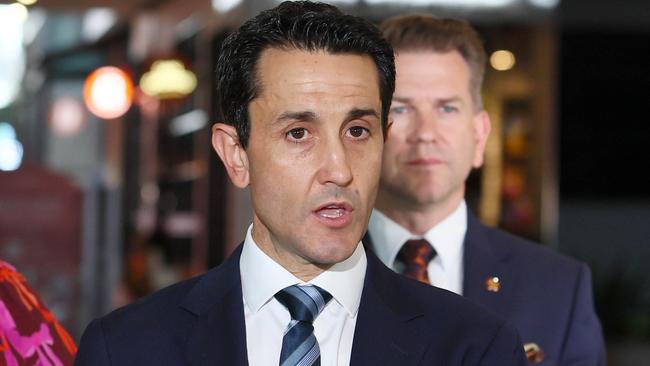Editorial: LNP must move from pointscoring to actually governing
The LNP has been busy exposing the state of the state left by Labor, but it will soon have to get busy actually governing, writes the editor.

Opinion
Don't miss out on the headlines from Opinion. Followed categories will be added to My News.
David Crisafulli and his new ministers are clearly revelling in the first stage that is enjoyed by new governments taking over from long-term incumbents – ferreting out the tucked-away secrets of their predecessors.
Daily, it seems, the new LNP government issues yet another media release highlighting its latest discovery of blown budgets and cost overruns under Labor’s watch.
The most recent example was just yesterday – a joint statement from Treasurer David Janetzki
and Water Minister Ann Leahy that trumpeted “water infrastructure blows out by $6.5bn under Labor”. The ministers declared that the cost overruns – revealed by “new departmental analysis of 11 key water infrastructure projects” – were “another example of Labor’s lack of transparency and fiscal vandalism”.
Last week, the LNP told us of “a half-a-billion-dollar budget blowout in the residential care sector that the former government knew about and did nothing to stop”. Before that, was the LNP’s announcement the real cost of the Pioneer-Burdekin Pumped hydro dam would have been around $36bn – three times the original $12bn estimate, if it had not moved to axe it upon taking office.
It’s all great fun for the incoming victors, but Mr Crisafulli and his ministers need to keep in mind that stage two is looming – the actual business of governing. Pointing out Labor’s failures gets you only so far.
The LNP needs to quickly work out what it is doing to fix all these messes left by the previous mob.
One of the LNP’s most pressing problems is the Labor
government-endorsed Best Practice Industry Conditions (BPIC) Policy – the so-called CFMEU tax – which the new government says has boosted construction costs by at least 30 per cent and could cost the economy $17bn by 2030.
It has taken the logical step of tearing up current tenders for big new projects – among them the Townsville University Hospital expansion, originally costed at $530m, but now $1bn, according to Health Minister Tim Nicholls – with the aim of reissuing them without a BPIC. We will find out soon enough if the market comes back with quotes below the BPIC-inflated levels, but the government still has the problem of what to do with the many billions of dollars of expensive government projects already operating under BPIC.
It says it has a plan – a new Productivity Commission, which will help “restore productivity to Queensland building sites”.
Just how it will achieve this is unclear. The best Mr Janetzki can offer is that the commission’s first task will be a review of the building industry, which will put BPIC “under the microscope to restore productivity to worksites”.
We are going to have to wait six months or so until the new productivity commission tells us what it’s come up with as a solution.
Governing is hard work – much harder than gleefully pointing out the failings of the other side, even when you’ve finally got the inside knowledge. The LNP is finding this out, as all new governments do.
GAS SHORTAGE A CRITICAL CHALLENGE
Two weeks ago we set off a political firestorm with our deep-dive into a critical issue facing Australia in coming years – a looming national gas shortage, which could threaten household power supplies.
We reported that those who live and breathe this industry warned the only way to avert this was for politicians and regulators to end what are currently lengthy delays in approving new projects that will increase the supply of gas.
Today, writing in these pages, federal Labor Resources Minister Madeleine King explains how reliable gas supplies will also be critical to the renewable transition – a “vital insurance policy … as we move to decarbonise our economy”.
She writes: “To put it simply – we will need to keep producing more gas in Australia to ensure a stable and orderly energy transition at home and in our region.”
Since our series, our competitors and critics have been very vocal in pointing out that – as we disclosed prominently at the time – the series was supported commercially by a number of companies involved in the gas sector.
As our readers would expect, these companies had no editorial control over what we published and any views expressed – nor did they determine the selection of any of the stories or issues covered.
However, on reflection we do acknowledge that – while their support was very prominently declared on the inside pages of the newspaper – we could have more clearly pointed that out in our December 2 front page story that launched this important series.
This acknowledgment in no way suggests we have any regrets about this content series more generally.
This is a critical issue of national importance – the very thing our readers would expect that we devote our journalistic resources and newspaper pages to exploring.
Responsibility for election comment is taken by Chris Jones, corner of Mayne Rd & Campbell St, Bowen Hills, Qld 4006. Printed and published by NEWSQUEENSLAND (ACN 009 661 778). Contact details here


